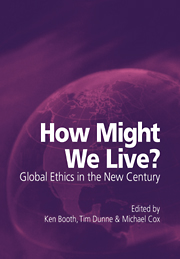Book contents
- Frontmatter
- Contents
- Notes on Contributors
- Acknowledgements
- Foreword
- Introduction: How Might We Live? Global Ethics in a New Century
- Individualism and the Concept of Gaia
- Bounded and Cosmopolitan Justice
- Globalization From Above: Actualizing The Ideal Through Law
- A More Perfect Union? The Liberal Peace and the Challenge of Globalization
- International Pluralism and the Rule of Law
- Towards a Feminist International Ethics
- Contested Globalization: The Changing Context and Normative Challenges
- Universalism and Difference in Discourses of Race
- Does Cosmopolitan Thinking Have a Future?
- Individuals, Communities and Human Rights
- Thinking About Civilizations
- Index
Globalization From Above: Actualizing The Ideal Through Law
Published online by Cambridge University Press: 04 August 2010
- Frontmatter
- Contents
- Notes on Contributors
- Acknowledgements
- Foreword
- Introduction: How Might We Live? Global Ethics in a New Century
- Individualism and the Concept of Gaia
- Bounded and Cosmopolitan Justice
- Globalization From Above: Actualizing The Ideal Through Law
- A More Perfect Union? The Liberal Peace and the Challenge of Globalization
- International Pluralism and the Rule of Law
- Towards a Feminist International Ethics
- Contested Globalization: The Changing Context and Normative Challenges
- Universalism and Difference in Discourses of Race
- Does Cosmopolitan Thinking Have a Future?
- Individuals, Communities and Human Rights
- Thinking About Civilizations
- Index
Summary
Becoming
We, human beings and human societies, are processes of becoming. We are what we have been and what we will be. What we have been, what we call our past, exists nowhere else than as an idea in our minds. What we will be, what we call our future, exists nowhere else than as an idea in our minds. What we call the present is the vanishing-point between the past and the future, a mere idea within our minds of the relationship between what we have been and what we will be. In the continuous present of our idea of our becoming, we present the past and the future to ourselves as a contrast between an actuality and a potentiality.
In the continuous present of our idea of our becoming, we can constantly reimagine the actuality of our past, through the mental processes which we call personal memory and social history, but that is the limit of the potentiality-for-us of the past. Otherwise the past is beyond our power. And we can imagine, and constantly re-imagine, the potentiality-for-us of the future, imagining what we could become, what we will be. But, in the case of the future, the human mind understands its relationship to the future in the form of a strange paradox, a strange feature of the way in which the human mind seems to have evolved within the evolution of all living things, within the development of the universe of all-that-is.
- Type
- Chapter
- Information
- How Might We Live? Global Ethics in the New Century , pp. 61 - 80Publisher: Cambridge University PressPrint publication year: 2001
- 1
- Cited by



